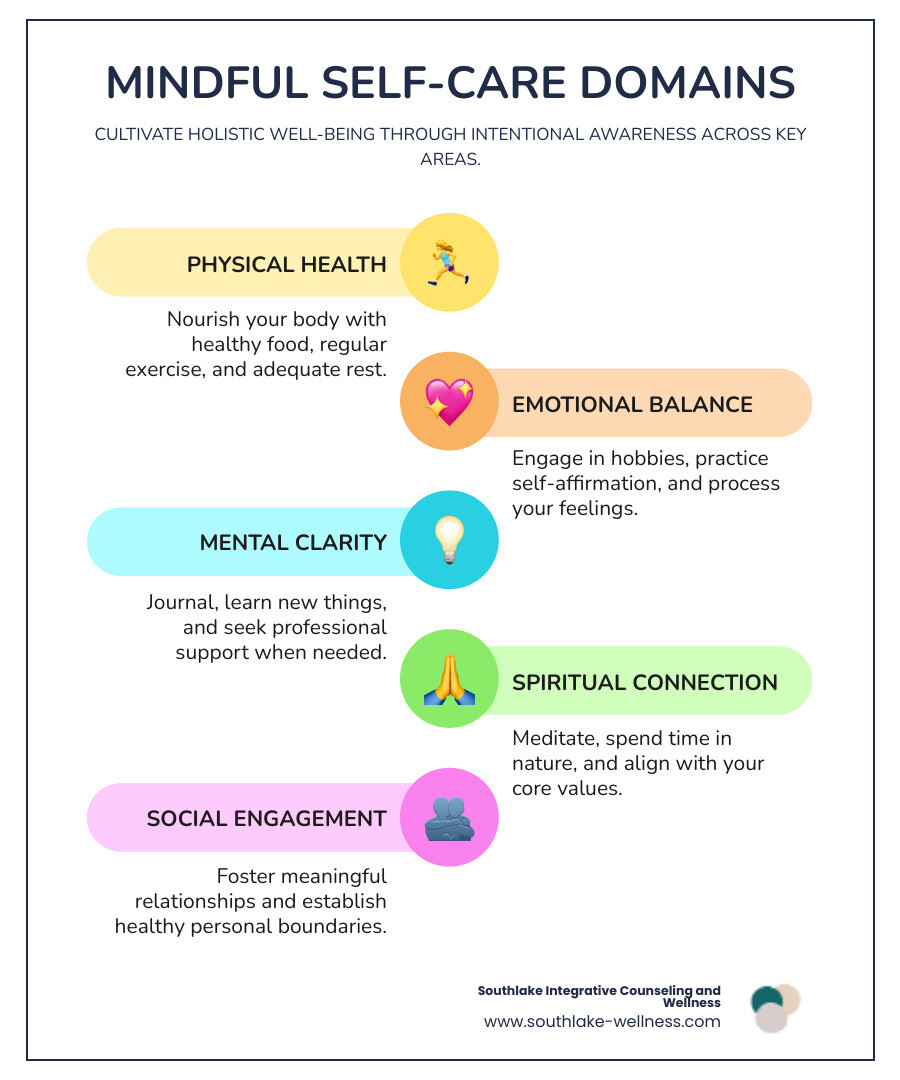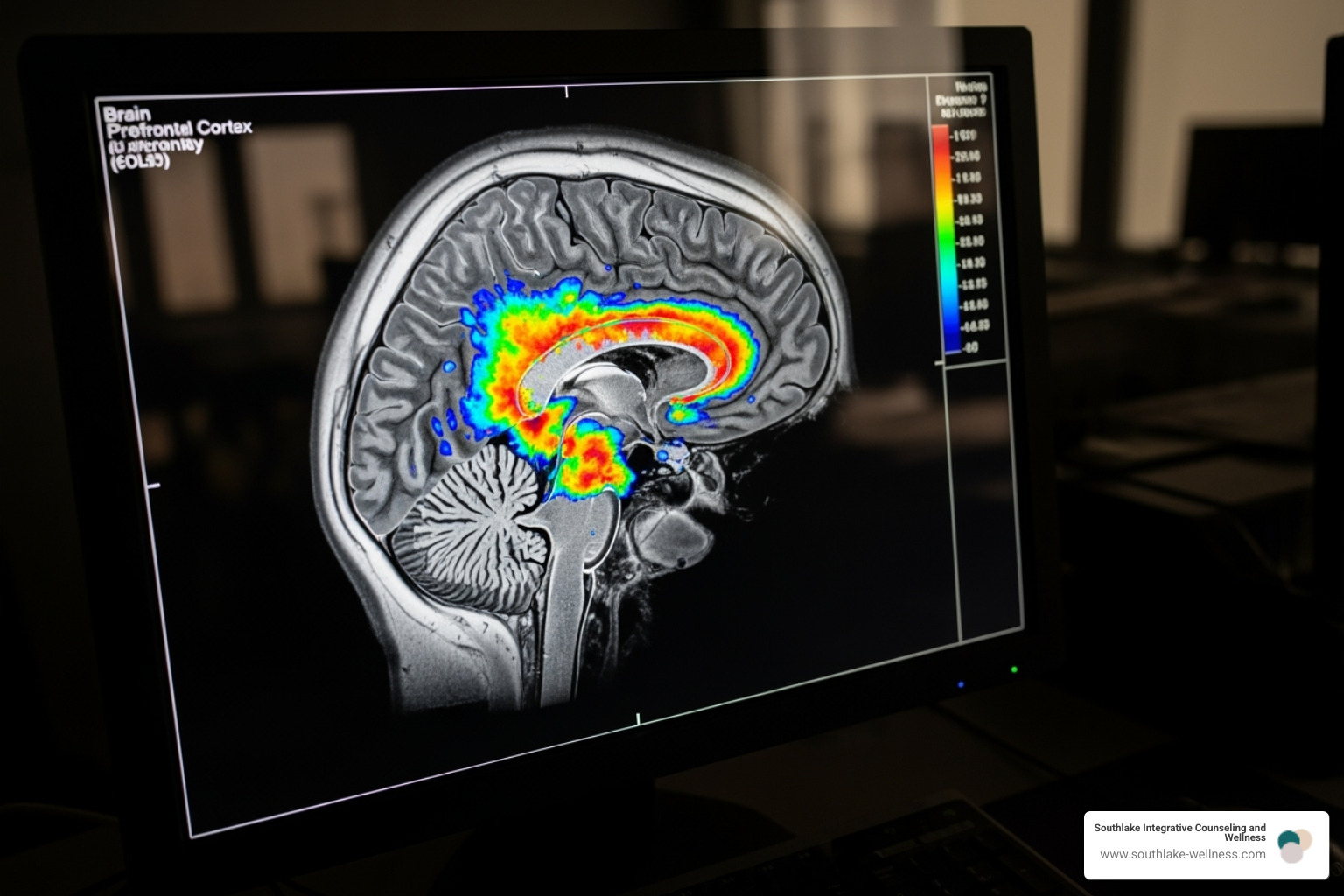
Why Mindfulness-Based Therapy Is a Game-Changer for Self-Care
Does mindfulness based therapy help for self care? Yes, it absolutely does. Research shows that mindfulness-based interventions like Mindfulness-Based Stress Reduction (MBSR) and Mindfulness-Based Cognitive Therapy (MBCT) significantly improve self-care. They reduce stress, anxiety, and depression while increasing self-compassion and emotional regulation. These therapies provide structured tools to manage difficult emotions, set healthy boundaries, and develop a deeper connection with yourself.
Here's what the evidence tells us:
- Reduces stress and anxiety: Mindfulness leads to significant decreases in stress and anxiety.
- Improves self-compassion: It helps you treat yourself with the same kindness you'd offer a friend.
- Prevents burnout: It provides notable reductions in burnout symptoms for professionals in demanding fields.
- Improves emotional regulation: Mindfulness helps you observe feelings without judgment, creating space to respond thoughtfully.
- Supports long-term well-being: Regular practice is linked to better sleep, focus, and overall psychological health.
For many, self-care has become another chore. We schedule massages and buy bath bombs, yet still feel overwhelmed. The missing piece isn't what we do, but how we approach it.
Mindfulness-based therapy offers a different path. Instead of a to-do list, it teaches you to cultivate moment-to-moment awareness of your needs. This helps you identify what you truly need—physically, emotionally, and mentally—rather than following generic advice.
I'm Holly Gedwed, and in my 14 years as a clinician specializing in trauma and addiction, I've seen how mindfulness provides clients with practical tools for sustainable wellness. Through approaches like Cognitive Behavioral Therapy (CBT), Dialectical Behavioral Therapy (DBT), and Acceptance & Commitment Therapy, I help individuals customize strategies that align with their unique goals.
This article will show you how mindfulness-based therapy supports self-care, what the science says, and practical strategies you can start using today.

What is Mindfulness and How Does It Connect to Self-Care?
If you've heard the word "mindfulness" thrown around, you might wonder what it actually means. Dating back 2,500 years, it's far from a new trend. At its heart, mindfulness is the practice of paying attention to the present moment without judgment. It's not about emptying your mind, but simply noticing what's happening right now—your thoughts, feelings, and physical sensations—with curiosity and acceptance.

Self-care refers to the intentional actions we take for our physical, mental, and emotional well-being. It's about nurturing yourself and listening to what you need. Mindfulness and self-care are deeply intertwined. Mindfulness isn't just another self-care task; it's the foundation that makes all your other efforts effective.
When you're mindful, you become more aware of your internal signals. You notice stress building before it's overwhelming or recognize when you're emotionally drained. This increased awareness of your needs allows you to respond proactively. Mindfulness strengthens the mind-body connection, guiding you toward self-care that genuinely helps. It also improves emotional regulation, giving you the space to choose how to respond to difficult feelings rather than being controlled by them.
The Core Components of a Mindful Practice
A mindful practice develops key skills that change how you relate to your experience:
- Attention control: Training your focus to stay anchored in the present.
- Non-reactivity: Pausing between a trigger and your response, allowing for a thoughtful choice.
- Self-awareness: Recognizing your patterns, triggers, and needs.
- Acceptance: Acknowledging reality as it is, which frees up energy from resistance.
- Present-focused attention: Grounding yourself in the here and now, reducing rumination and anxiety.
Why Traditional Self-Care Isn't Always Enough
Many of us have tried the typical self-care routine—bubble baths, walks, face masks—but still feel exhausted. The problem is often that we treat self-care as another task to check off a list, rather than tuning in to what we truly need. This is "self-care as a task" instead of genuine nourishment.
When you disconnect from your actual needs, even "good" habits can miss the mark. You might force yourself to go to yoga when you really need rest. Some people even experience burnout from self-care itself, feeling frustrated when their efforts don't lead to relief.
Does mindfulness based therapy help for self care by teaching you the "how" behind effective self-care? Absolutely. It transforms self-care from a superficial checklist into a deeper connection to self. This shift moves you from reactive to proactive care, helping you notice early warning signs and respond with what you actually need.
At Southlake Integrative Counseling and Wellness, we understand that effective self-care requires this mindful awareness. Our holistic approach helps you develop the skills to listen to yourself and respond with compassion.
The Science-Backed Benefits of Mindfulness for Well-Being
The popularity of mindfulness is supported by decades of rigorous scientific research. Neuroscientists and psychologists have documented how these practices create measurable changes in brain function and overall health, offering concrete improvements in daily life.

Scientific research confirms that mindfulness is associated with cognitive, psychological, and physical health benefits. The evidence is particularly strong for stress, anxiety, pain, depression, insomnia, and high blood pressure. Study after study shows that regular practice provides genuine relief. This is why does mindfulness based therapy help for self care—it addresses the root causes of distress, not just the symptoms.
Mental and Emotional Health Improvements
Regular mindfulness practice rewires how your brain responds to stress, leading to profound emotional shifts.
- Reduced rumination: Mindfulness helps you step back from the exhausting mental habit of replaying worries. You learn to observe thoughts without being trapped by them.
- Improved emotional regulation: Mindfulness expands the space between a trigger and your reaction, allowing you to pause and choose your response. This skill can transform relationships and work situations.
- Protection against job burnout: For professionals in high-stress fields, mindfulness is a critical tool. Evidence on mindfulness for mental health shows that interventions like MBCT and MBSR significantly reduce burnout and stress.
- Stronger coping skills: You develop a more balanced, resilient attitude toward challenges, becoming better equipped to handle them without feeling overwhelmed.
- Reduced psychological distress: Mindfulness interventions are highly effective at reducing overall psychological distress and improving well-being.
Physical Health and Mindfulness
The mind-body connection is powerful, and mindfulness strengthens it in healing ways, leading to measurable physical benefits.
- Insomnia relief: By calming the nervous system and quieting mental chatter, mindfulness helps you fall asleep more easily and sleep more deeply.
- Lower blood pressure: Consistent practice activates the body's relaxation response, counteracting stress hormones that lift blood pressure.
- Symptom support: Early research suggests mindfulness may help with symptoms of fibromyalgia and improve diabetes control by reducing stress hormones.
- Overall physical relaxation: Practices like body scans release tension you may not even realize you're carrying, shifting your body out of a chronic fight-or-flight state and into one of restoration.
These physical and mental benefits are interconnected. Reducing stress through mindfulness supports your immune system, lowers inflammation, and gives your body what it needs to function optimally.
How Does Mindfulness Based Therapy Help for Self Care?
While personal mindfulness practice is powerful, mindfulness-based therapy offers a structured approach. These programs combine mindfulness with psychological principles to address specific challenges and build lasting self-care habits. Does mindfulness based therapy help for self care by providing a roadmap to change your relationship with your thoughts and emotions? Yes, it equips you with skills to manage life's storms and prevent unhealthy patterns.
At Southlake Integrative Counseling and Wellness, we use these integrated approaches to foster long-term emotional balance and resilience. Our therapy approaches are designed to weave these strategies into your daily life.
Key Mindfulness-Based Therapies: MBSR and MBCT
Two well-researched approaches are Mindfulness-Based Stress Reduction (MBSR) and Mindfulness-Based Cognitive Therapy (MBCT).
- MBSR, pioneered by Jon Kabat-Zinn, was developed to help people cope with chronic pain and stress. It uses meditation, body awareness, and gentle yoga to teach you how to respond differently to discomfort. For self-care, MBSR provides a toolkit to manage daily stressors and create calm.
- MBCT combines MBSR with cognitive behavioral therapy techniques. It was designed to prevent depression relapse by helping you recognize and step away from spiraling negative thought patterns. MBCT fosters a kinder awareness of your thoughts, which is foundational for mental well-being.
Both therapies go beyond surface-level self-care, addressing the deeper patterns that affect your well-being.
Does mindfulness based therapy help for self care by Fostering Self-Compassion?
One of the most transformative benefits is nurturing self-compassion. Many of us have a harsh inner critic, making genuine self-care difficult. Unlike self-esteem, which depends on success, self-compassion means treating yourself with kindness when you're struggling, just as you would a friend.
This involves recognizing that imperfection is part of the shared human experience and holding painful feelings in balanced awareness. Mindfulness-based therapies actively cultivate this compassionate stance by teaching you to observe your thoughts without judgment. As research on burnout and stress from the American Psychological Association shows, self-compassion is a powerful buffer against burnout.
Does mindfulness based therapy help for self care in Demanding Professions?
For those in high-stress fields like healthcare or counseling, self-care is essential for survival. The constant pressure can lead to burnout and compassion fatigue. This is where mindfulness-based therapy becomes career-saving.
Research shows that mindfulness training for counseling trainees leads to significant positive changes in empathy, self-compassion, stress reduction, and professional confidence. In fact, mindfulness was the most significant factor contributing to their counseling self-efficacy. It helps professionals:
- Increase confidence in handling complex situations.
- Deepen empathy without becoming overwhelmed.
- Reduce stress levels to prevent burnout.
- Set healthy boundaries by being more attuned to internal signals.
- Improve focus and attention, which improves performance.
These benefits extend to all demanding professions. Mindfulness-based interventions offer meaningful short-term relief from stress-related symptoms for healthcare workers. You can't pour from an empty cup, and these therapies help professionals keep their cups filled through fundamental shifts in how they relate to stress and themselves.
Practical Strategies for Integrating Mindfulness into Your Daily Routine
Here's the wonderful truth about mindfulness: you don't need to carve out hours of your day to experience its benefits. The real magic happens when you bring intentional awareness to the ordinary moments of your life. Think of it as a skill: starting small, staying consistent, and making it a habit are what truly matter.

Simple Mindfulness Exercises for Beginners
The best mindfulness practice is the one you'll actually do. These simple exercises fit into any schedule, proving that does mindfulness based therapy help for self care through accessible, everyday actions.
- Mindful breathing: For just sixty seconds, sit and notice your breath. Feel the air enter and leave your body. When your mind wanders, gently guide it back. This anchor can be used anywhere, anytime.
- Body scan meditation: Lie down and bring your attention to sensations in your body, starting from your toes and moving up to your head. This practice releases hidden tension.
- The 5-4-3-2-1 grounding technique: When overwhelmed, anchor yourself by identifying five things you see, four you can touch, three you can hear, two you can smell, and one you can taste. This interrupts racing thoughts.
- Mindful eating: Transform a meal into a sensory experience. Notice the colors, aromas, and flavors of your food. Chew slowly and savor each bite. This improves digestion and helps you recognize fullness.
- Mindful listening: Give someone your full attention when they speak. Put away distractions and truly hear their words and tone. This simple shift can transform your connections.
Overcoming Common Challenges in Your Practice
Starting a mindfulness practice comes with predictable problems. Knowing them ahead of time helps.
- "I don't have time!" You don't need hours. Weave mindfulness into activities you already do, like brushing your teeth or drinking coffee. Consistency matters more than duration.
- "My mind is too busy!" The goal isn't an empty mind. Your mind's job is to think. The practice is noticing when your mind has wandered and gently bringing it back. That moment of noticing is the success.
- "I get bored or fall asleep." If boredom arises, get curious about the sensation itself. If you fall asleep, it might mean you need more rest. Try practicing while sitting upright. Both are just information, not failures.
Using guided meditations from apps or online resources can be very helpful. At Southlake Integrative Counseling and Wellness, we also offer Mindfulness Based Group Therapy to provide a supportive community for your practice.
The most important tip is to practice non-judgment, especially toward yourself. When your mind wanders, don't get frustrated. The wandering is the opportunity to practice returning. This gentle act of returning, again and again, is how mindfulness transforms your relationship with yourself and is the heart of sustainable self-care.
Conclusion
The answer is clear: does mindfulness based therapy help for self care? Yes. It provides practical tools to reduce stress, cultivate self-compassion, and tune into your genuine needs instead of following generic routines.
The science confirms it, showing measurable improvements in mental, emotional, and even physical health. For professionals in demanding careers, mindfulness is a key to preventing burnout and thriving at work.
What makes mindfulness transformative is its shift from self-care as a task to a way of being. It helps you find what truly nourishes you in the moment. You don't need a life overhaul to begin; a few minutes of mindful breathing or a single mindful meal can start the process. Small, consistent practices lead to lasting change.
At Southlake Integrative Counseling and Wellness, our approach is built on this foundation. We believe true wellness comes from cultivating awareness, building resilience, and honoring the mind-body connection. Our holistic methods combine evidence-based therapies with mindfulness to create personalized plans that fit your life.
If you're ready to move beyond superficial self-care toward a sustainable practice, we're here to help. Explore our holistic counseling services and find how a mindful approach can lead to a healthier, more balanced you.